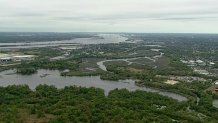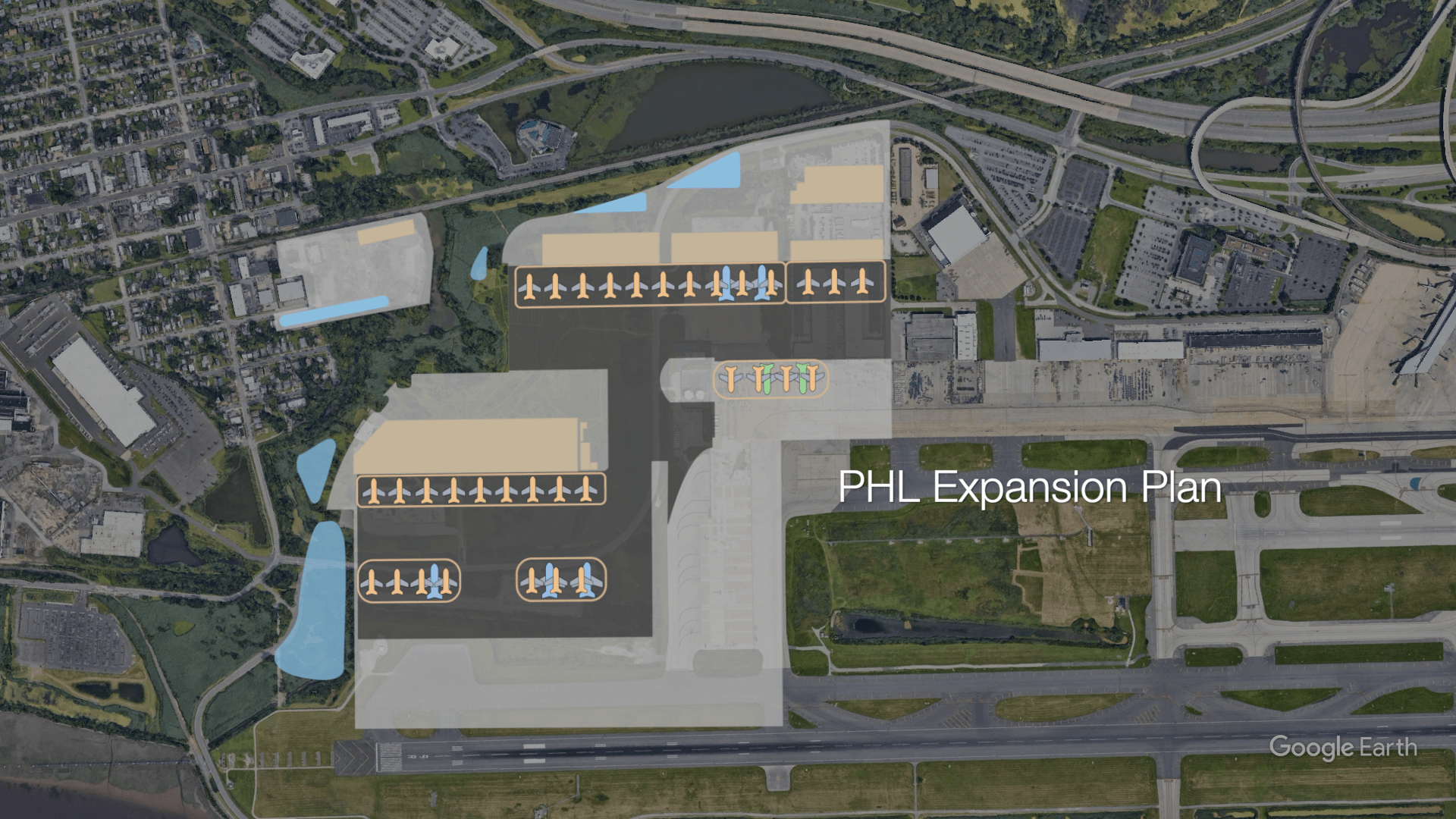Walt Kalenski stares across the brush and creek at the fence lined with black plastic. Only the creek, the fence and a few hundred feet separate his home from Philadelphia International Airport.
The home and the airport have one thing in common: they both sit on a floodplain.
“All this will be under water if I get three days of rain,” Kalenksi says as he stands outside his house. He still remembers Hurricane Floyd in 1999, when water came up to his house’s rafters and caused thousands of dollars worth of damage.
Kalenski is part of a battle between residents like himself, environmentalists and officials from Delaware and Philadelphia counties. As the officials look to expand the airport with the promise of jobs and revenue for the local economy, residents and environmentalists worry that flooding in the area will only get worse.
The plan is to expand PHL’s cargo business, including a new taxiway and parking lot, onto 120 acres of the surrounding floodplain. The area will lose more than 15 acres of wetlands that absorb floodwaters in the region.

In a virtual town hall last fall, the airport said the expansion could bring 28,000 jobs and generate nearly $1 billion for the local economy.
“Our goals are ambitious and they will take years to complete, but at the end of this program, the economic impact will be massive,” Philadelphia International Airport CEO Chellie Cameron said.
However, neighbors fear those potential economic gains could cost them their homes – or worse.
We don’t want to lose any lives back here."
Carolyn Moseley, Eastwick resident
Carolyn Moseley is a resident of Philadelphia’s Eastwick neighborhood, separated from the airport only by the lanes of nearby Interstate 95. Crucially, the neighborhood is also prone to flooding.
“We’re at the bottom of the bowl. We don’t want to lose any lives back here,” Moseley said.
But neighbors aren’t the only ones raising alarms.
Josh Lippert is Philadelphia’s former floodplains manager. For nearly five years, he was responsible for regulating the city’s flood-prone areas.
Lippert believes building PHL’s expansion on the surrounding wetlands will make the airport more vulnerable to flooding and would place surrounding areas at risk.
“They’re going to build runways and large hangers and buildings. Where is the water going to go? It’s going to push it downstream to adjacent communities or even upstream to communities like Eastwick,” Lippert said.
Philadelphia officials also know the risks.
In 2015, the city released a report that indicated “sea level rise and flooding pose the greatest [climate] risk to the airport.”
Residents in both Philadelphia and Tinicum Township aren’t giving up their yearslong fight against the project, though.
Philadelphia International Airport Expansion Areas
Source: Pennsylvania Spatial Data Access
Credit: Andrew Williams/NBC
Patrick McCarthy, president of the Tinicum Township Board of Commissioners, explained that even though the airport is owned and operated by the City of Philadelphia, it has tried to expand further into Tinicum in the past – but the township has held its ground.
McCarthy said the project poses a dilemma for his township.
On the one hand, the airport expansion could mean big benefits – especially in the form of tax revenue for schools – for the town of fewer than 4,000 people. But on the other hand, noise and traffic and flood risks remain major concerns.
“I think we’re stuck between a rock and a hard place,” McCarthy said. “So to be quite honest, I mean, we need the jobs and all. And with modern technology, I think you know, you can mitigate as best you can and control things.”
The airport plans to mitigate flood risks by establishing new wetlands in Philadelphia’s FDR Park and building additional storm water basins at the project site.
The Federal Aviation Administration has signed off on the expansion, saying it will “not have any significant environmental impact.”
The airport declined NBC10’s request for an interview. So did the city’s Office of Sustainability, which works to address climate change.
However, Mayor Jim Kenney told NBC10 that Philadelphia is in the process of determining how to use federal infrastructure dollars, with “a lot of it” centered on flood mitigation.
The nonprofit climate science organization Climate Central has predicted that – without any mitigation, and not even taking the airport’s plans to expand into consideration – flooding will steadily increase in and around the PHL area in the coming decades as a result of sea level rise and more intense storms.
Daniel Gilford, a Climate Central scientist, said builders today should consider flooding risks 30 years from now.
“If you’re thinking about making investments for the long term, and you’re interested in for instance the locations that your children may be spending time in, then it would be very important to invest in a future that is sustainable,” Gilford said.
McCarthy, the Tinicum Township Board of Commissioners president, said he’s confident the airport expansion project will adequately mitigate flood risks. The township’s engineers won’t let the project proceed otherwise, he said.
The airport is now waiting on the Army Corps of Engineers to issue a permit to move forward with the expansion. The Army Corps told NBC10 it is currently evaluating the plan and looking over comments submitted by the public and responses from the city.
In the meantime, Kalenski, whose home is located near the development, is bracing for floods.
“There’s not much else we could do, you know. Just wait and see,” he said.
NBC10 digital reporter Rudy Chinchilla contributed writing to this report. NBC data and graphics reporter Andrew O'Day Williams designed the graphics.

